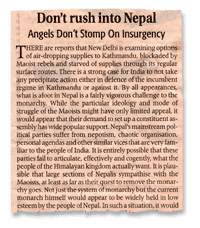 Indian officials last week leaked to the New Delhi media that India was considering "bread bombing" Kathmandu if the Maoist blockade got worse.
Indian officials last week leaked to the New Delhi media that India was considering "bread bombing" Kathmandu if the Maoist blockade got worse. Back in the old days, such a leak would have resulted in a slew of sponsored editorials in the Indian press enthusiastically endorsing official concern about Nepal and echoing its geo-strategic interest in Nepal. It is an indication of how much things have changed that editorials in the main Indian papers the next day warned the government to stay out of Nepal's internal affairs.
'It is in India's longterm interests to champion democracy in the neighbourhood without active interference in other countries' internal affairs,' wrote the Economic Times on 23 August (see clipping above). Another editorial in its sister publication, The Times of India on 24 August echoed this view and even went on to diverge from the official Indian stance on UN mediation by saying the world body should be allowed to 'take an active role' to mediate peace talks in Nepal. (see box)
The Indian Express, which is edited by India's foremost geopolitical expert, Shekhar Gupta, makes its stand quite clear: 'As a neighbour that could be affected by the fallout, India can only wish Nepal well.'
All this is surprisingly objective by past standards. People in Kathmandu remember the Indian media's simplistic and inaccurate reporting during the IC813 hijacking debacle in December 1999 and the Hrithik Roshan riots that stigmatised Nepal as a hotbed of ISI activity.
Recent reporting about the Kathmandu blockade on Indian television may have been exaggerated, but atleast the op-ed pages didn't parrot the official line. Is this a sign of changing times?
"If the editorials are any indication, the Indian media has finally got over its Cold War hangover," says Yubaraj Ghimire, editor of the Kathmandu weekly Samaya, who worked in for various Indian media in New Delhi for 20 years. "It also shows that they are willing to recognise international peace efforts in Nepal."
This is a view shared by other India-watchers here, who have noticed that the Indian media's coverage of neighbours has graduated from patronising preachiness to factual and non-ideological reporting. "Indian journalism has shed its ideological baggage, it has become much more professional," another media analyst told us. "My only complaint is that Nepal is still a blind spot and they have underestimated the seriousness of the insurgency here and its potential for a spillover into India."
Political scientist Dhruba Kumar at Tribhuban University cautions against overplaying this change. "Since Nehru's time, the Indian media has openly supported the country's foreign policy towards its neighbours. That link still exists. We just see hints of a softening these days," Kumar told us, adding, "this doesn't mean they are totally liberated from South Bloc."
However, coverage of the blockade was one indication of the shift. Although the reporting was alarmist, at least it woke up the Indian officialdom and the public about the fact that Nepal is in crisis. As the Economic Times wrote: 'India must severe links between the insurgents in Nepal and the so-called Maoists of domestic vintage.'
India's business press has also drawn attention to the Maoist closure of companies in Nepal with Indian investment as well as threats against other businesses. "The Indian media is seeing a generation change. It has moved away from grey-celled academia and retired bureaucrats to young and open journalists who aggressively question the conventional wisdom of New Delhi's grand promenade," said another Kathmandu-based India-watcher.


